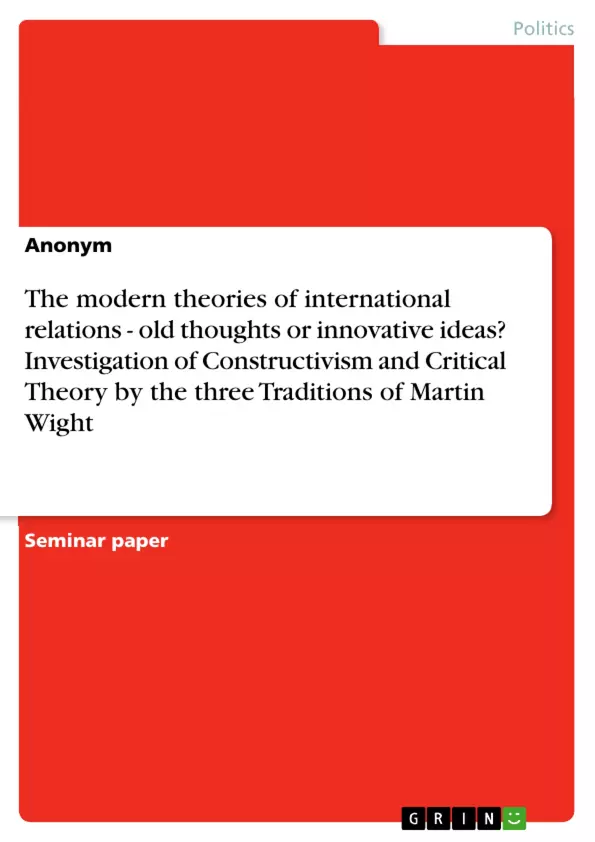Martin Wight, a lecturer of international business relations, member of the “British Committee”, as well as founder of the English School, first mentioned in his lectures the three traditions of the international theories which have been edited in a book with the title “Martin Wright, International theory: the three traditions” by his former students after his death. In his reflections about the international politics and the leading theories he tries to classify the three leading schools and to show the continuity of those. In this connection, the two basic facts of the international relations are formulated. Firstly that there is no “body” in the international theory , but the individual schools of theory influence and cross each other, and secondly that the new theoreticians learn from the old ideas, so that the new theories are simply shift of the stress in the old kind of thinking, but do not represent a new and independent theory, or to say it with Wights words: “ (the) leading premiss is that political ideas do not change much, and the range of ideas is limited.”
Based on this assumption I will analyse in the following the Constructivism of Alexander Wendt und the Critical Theory according to Andrew Linklater which belong to the post-positivistic group of the international theories. In this connection I will use Wight’s traditions to check, whether his claims will be acknowledged or whether these modern theories establish a new and independent line.
Starting with a short introduction in the main characteristics and main statements of the several schools I will assign the modern theoreticians to the corresponding traditions of Martin Wight using the statements concerning the human nature, the international society, the national state as well as the foreign policy and the international law. Furthermore I will check whether and where they are similar in order to discuss an conclusion where there are differences and similarities between the ancient and the new „thinkers“ and to what extent the statement of Wight is justified or not.
Table of Contents
- Preface
- Key-attributes and main representatives of the separate theories.
- The English School and Martin Wight
- The Constructivism and Alexander Wendt
- The Critical Theory and Andrew Linklater
- Old and new in the modern theories- Constructivism as well as Critical Theory and the three traditions.
- Human nature
- International society
- National state
- Foreign policy
- International cooperation
- Diplomacy
- International law and ethics
- Conclusion
Objectives and Key Themes
This paper aims to analyze the theories of Constructivism, represented by Alexander Wendt, and Critical Theory, represented by Andrew Linklater, within the framework of Martin Wight's three traditions of international relations. The analysis will focus on whether these modern theories represent a new and independent line of thought or simply shift the emphasis of older ideas.
- The three traditions of international relations theory as defined by Martin Wight.
- The key features and main representatives of Constructivism and Critical Theory.
- The relationship between the modern theories and the three traditions in terms of human nature, international society, the national state, foreign policy, and international law and ethics.
- The similarities and differences between modern and traditional approaches to international relations.
- The extent to which Martin Wight's assertion that political ideas change very little is justified.
Chapter Summaries
- Preface: This chapter introduces the topic of the paper, which is to investigate whether modern theories of international relations, particularly Constructivism and Critical Theory, represent new ideas or simply shifts in emphasis from older theories. The author highlights Martin Wight's three traditions of international relations and their relevance to the analysis.
- Key-attributes and main representatives of the separate theories: This chapter outlines the three traditions of international relations as defined by Martin Wight: Realism (Machiavellian), Rationalism (Grotian), and Revolutionism (Kantian). It also introduces the key representatives of Constructivism (Alexander Wendt) and Critical Theory (Andrew Linklater), highlighting their main characteristics and statements.
- Old and new in the modern theories- Constructivism as well as Critical Theory and the three traditions: This chapter explores the extent to which Constructivism and Critical Theory align with or deviate from the three traditions of international relations. It examines the modern theories' perspectives on human nature, international society, the national state, foreign policy (including international cooperation and diplomacy), and international law and ethics.
Keywords
The central keywords and concepts of this work include Constructivism, Critical Theory, Martin Wight's three traditions of international relations (Realism, Rationalism, Revolutionism), human nature, international society, the national state, foreign policy, international cooperation, diplomacy, international law and ethics, and the intersubjectivity of the human world. The paper explores the relationships between these concepts and seeks to determine whether modern international relations theories represent truly innovative ideas or simply reconfigurations of older frameworks.
- Citar trabajo
- Anonym (Autor), 2005, The modern theories of international relations - old thoughts or innovative ideas? Investigation of Constructivism and Critical Theory by the three Traditions of Martin Wight, Múnich, GRIN Verlag, https://www.grin.com/document/50504



